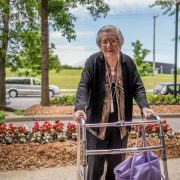How to Promote Social Wellness in Memory Care Assisted Living
Supporting social wellness is a key part of quality care for individuals living with memory loss. Strong social connections help create stability, comfort, and a sense of purpose in daily life. For residents in memory care settings, regular social interaction offers real benefits:
- Encourages emotional well-being
- Reduces feelings of isolation or confusion
- Supports cognitive function through engagement
- Strengthens a sense of identity and belonging
However, memory challenges can make it more difficult for individuals to initiate or maintain relationships independently. This is where staff and caregivers play a central role by creating consistent opportunities for connection and shaping an environment where every resident feels included and valued. When social wellness is built into the daily rhythm of care in memory care assisted living, it leads to more engaged residents and a stronger sense of community throughout the facility.
Why Social Wellness Matters in July
July marks Social Wellness Month in the United States. It’s a time set aside to highlight the value of building and maintaining strong, healthy relationships. While this message applies to everyone, it holds a deeper meaning for individuals with memory challenges and the caregivers who support them.
For residents in supportive environments, consistent social engagement can improve emotional stability, provide comfort, and help reconnect them with moments of joy. For family and friends, it is also a reminder to stay meaningfully involved, even when communication or recognition becomes difficult.
In the context of memory care, social wellness means more than casual interaction. It involves creating safe, structured opportunities for residents to connect through shared routines, familiar conversations, and purposeful group activities. It’s about fostering a sense of belonging in a setting where confusion or isolation can otherwise take hold.
By using Social Wellness Month as a cue, care teams can refocus on the emotional dimension of care and bring fresh energy into the everyday life of a memory care assisted living community.
Fostering Connections Through Group Activities
Conducting group activities is one of the most effective ways to support social wellness, especially for individuals in memory care assisted living, where daily connection plays a central role in emotional and cognitive well-being.
Here are some ideas:
- Art classes focused on painting, drawing, or crafting
- Music therapy sessions with singing, instruments, or guided listening
- Memory cafés for relaxed, themed social gatherings with caregivers
- Group storytelling or reminiscence sessions
- Audiobook clubs and short film discussions
- Gardening stations with raised planters or herb pots
- Group games like word puzzles or trivia
- Cooking or baking activities with guided steps
- Knitting or handcraft circles
Regardless of the activity type, it’s essential that programs are structured with social interaction in mind and thoughtfully adapted to match each resident’s cognitive and physical needs.
Encouraging Family Involvement and Community Ties
Family presence plays a critical role in helping individuals with memory challenges feel anchored, supported, and emotionally connected. Furthermore, community bonds can also lift spirits, reduce feelings of isolation, and foster a sense of belonging that enhances overall well-being.
There are many simple, meaningful ways assisted living staff and loved ones can help build these social bridges.
- Family game nights
- Virtual visits
- Intergenerational programs
- Holiday celebrations with relatives
- Collaborative cooking or crafting sessions
- Sharing stories or memory book projects
- Outdoor family picnics
Connection does not need to be grand to be powerful. It only needs to be present, consistent, and heartfelt in memory care assisted living.
Ready to learn more about life at Fallbrook Assisted Living? Click here!
Fallbrook Assisted Living is proud to offer its services to Fremont, NE, and surrounding areas and cities: Arlington, Cedar Bluffs, Ames Nickerson, Fontanelle, Arlington, Leshara, Colon, and Hooper




